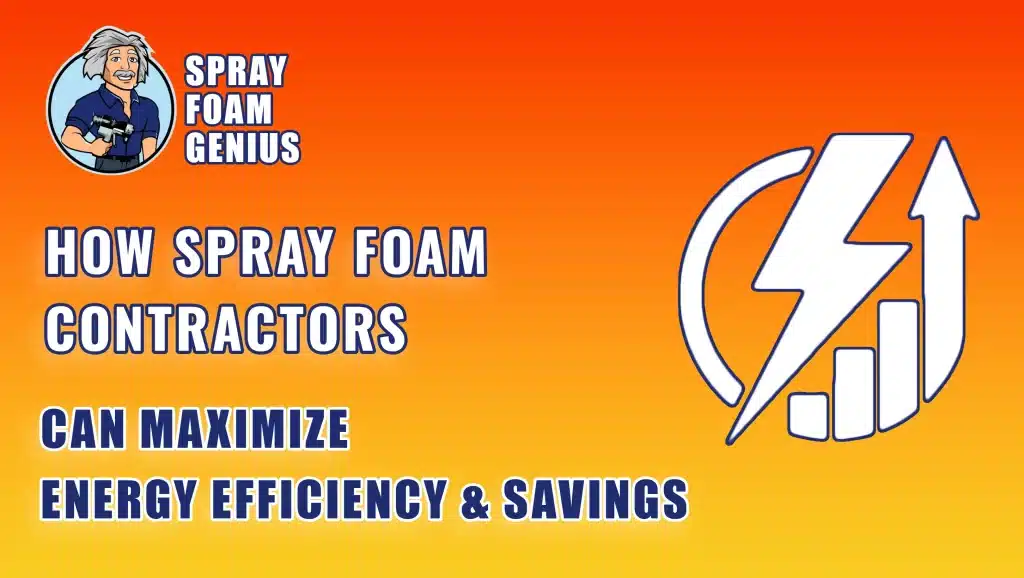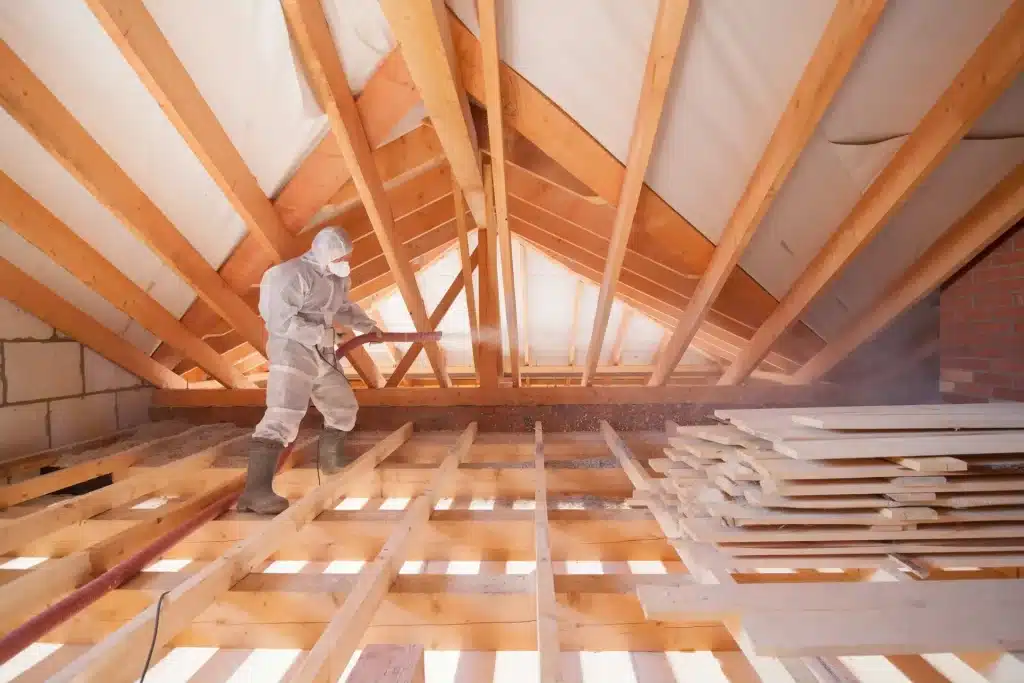
Spray foam insulation is one of the most effective and energy-efficient solutions available for homes and commercial buildings today. As a spray foam contractor, maximizing energy efficiency not only benefits your clients by reducing their energy bills but also enhances your reputation in the industry and boosts your business success. In this guide, we’ll explore how spray foam contractors can leverage their expertise to deliver energy-efficient solutions while improving customer satisfaction and profitability.
The Growing Importance of Energy Efficiency
In recent years, there has been a significant shift toward sustainability and energy efficiency, driven by both economic and environmental factors. With energy costs rising and the increasing focus on reducing carbon footprints, homeowners and businesses are looking for practical solutions to improve energy efficiency. Spray foam insulation is at the forefront of these solutions due to its ability to create airtight seals, prevent heat loss, and improve indoor air quality.
As a spray foam contractor, offering energy-efficient services positions your business as a leader in an industry that is becoming more essential with every passing year. By understanding the technology behind spray foam insulation and how it enhances energy efficiency, you can provide your clients with solutions that not only reduce their energy bills but also create long-term value.
The Basics of Spray Foam Insulation
Spray foam insulation is a type of insulation that is applied using a spray gun, which allows it to expand and fill gaps, cracks, and crevices in walls, ceilings, and floors. There are two main types of spray foam insulation: open-cell and closed-cell foam. Both types offer excellent insulation properties, but they work in slightly different ways.
Open-Cell Foam
This type of foam is lightweight, flexible, and expands to fill gaps. It’s best suited for interior applications, such as attics and walls.
Closed-Cell Foam
Closed-cell foam is denser and more rigid, offering a higher R-value (thermal resistance). It is ideal for areas with extreme moisture exposure, such as basements and crawl spaces.
Both types of spray foam provide an airtight seal, which helps prevent the infiltration of air, moisture, and pollutants, leading to a more energy-efficient environment. This is where spray foam contractors come in: by choosing the right foam and applying it correctly, contractors can significantly improve energy efficiency.
Maximizing Energy Efficiency Through Proper Installation

Proper installation is key to unlocking the full potential of spray foam insulation. As a spray foam contractor, you need to ensure that the insulation is applied uniformly and without gaps, voids, or compression. Even small errors in installation can lead to energy inefficiency, reducing the effectiveness of the spray foam.
Here are a few ways you can maximize energy efficiency during installation:
Correct Thickness
The thickness of the foam layer is critical to achieving optimal thermal performance. Be sure to follow manufacturer guidelines for the appropriate thickness, as this will ensure the foam performs as expected.
Fill All Gaps and Voids
Spray foam insulation expands upon application, but it’s important to ensure that it completely fills all cracks, gaps, and voids in the space being insulated. Leaving gaps can result in energy loss.
Layering
In some cases, multiple layers of foam may be needed to achieve the required R-value. Be sure to apply the foam in layers and allow each layer to expand fully before applying the next.
Avoid Over-Expansion
Over-expanding the foam can create unnecessary pressure on structures, causing deformation or damage. Proper application techniques will ensure the foam expands to the right size without causing issues.
Incorporating Advanced Techniques for Energy Efficiency
To further enhance energy savings for your clients, consider implementing advanced techniques and technologies that complement spray foam insulation. By offering a full suite of energy-saving services, you can provide even greater value and differentiate your business from competitors.
1. Air Sealing
One of the most significant factors contributing to energy inefficiency is air leakage. Even the best insulation can’t perform at its best if air is continuously flowing through gaps, cracks, and openings in the building. Air sealing, which involves the application of spray foam to gaps and cracks around windows, doors, and ducts, can help prevent energy loss by ensuring an airtight environment.
2. Combining Insulation with HVAC Optimization
A well-insulated home or building will keep the temperature more consistent, reducing the workload on HVAC systems. However, combining spray foam insulation with regular maintenance of HVAC systems can lead to further energy savings. Encourage your clients to have their heating and cooling systems serviced regularly, as well as consider upgrading to energy-efficient units.
3. Utilizing Reflective Barriers
In areas with intense heat or cold, combining spray foam insulation with reflective barriers can improve energy efficiency even further. Reflective barriers help prevent heat transfer from the outside and can be particularly effective in attics and roofs. By reflecting radiant heat away, these barriers help keep indoor spaces cooler in the summer and warmer in the winter.
4. Energy Audits and Thermographic Inspections
Energy audits are an excellent way to assess the effectiveness of spray foam insulation and pinpoint areas for improvement. Using thermal cameras, you can identify areas with heat loss, moisture, or air leaks. Offering thermographic inspections as part of your services can position your business as a trusted expert in energy efficiency.
Maximizing Cost Savings for Clients
As energy costs continue to rise, the return on investment (ROI) for energy-efficient solutions becomes a key selling point for spray foam contractors. By educating your clients on how spray foam insulation can help them save money in the long run, you can build trust and increase sales.
1. Long-Term Savings on Utility Bills
Properly installed spray foam insulation can reduce heating and cooling costs by up to 50%. This long-term energy saving helps offset the initial installation costs, making it an attractive investment for homeowners and businesses alike. Highlight these potential savings in your marketing materials to emphasize the financial benefits.
2. Tax Incentives and Rebates
Many governments offer tax incentives and rebates for energy-efficient home improvements. Make sure to inform your clients about these opportunities, as they can reduce the upfront costs of spray foam insulation. Research available incentives in your region and stay updated on any changes to energy efficiency programs.
3. Increased Property Value
Properties with energy-efficient features, including spray foam insulation, often have higher market values. Homebuyers and commercial property tenants are increasingly seeking out energy-efficient spaces that offer lower operating costs. By installing spray foam insulation, your clients are making a long-term investment in their property’s value.
Why Choose Spray Foam for Energy Efficiency?
Spray foam insulation is a superior choice when it comes to energy efficiency for several reasons:
- Airtight Seal: Spray foam creates an airtight seal that prevents drafts, which is essential for maintaining a consistent indoor temperature.
- Moisture Resistance: Closed-cell spray foam provides an additional layer of moisture protection, preventing mold and mildew growth, which can negatively impact indoor air quality and energy efficiency.
- Long-Term Durability: Unlike traditional insulation materials, spray foam doesn’t sag, shift, or settle over time. Its long-term performance ensures that the energy savings continue year after year.
By recommending spray foam insulation to your clients, you are offering them one of the most effective, durable, and energy-efficient solutions available.
Boost Your Business with Effective Marketing
To maximize the impact of your services, it’s essential to effectively market your energy-efficient spray foam insulation solutions. At Spray Foam Genius Marketing, we specialize in helping spray foam contractors in the USA and Canada optimize their online presence through professional SEO, Google Business Profile optimization, and lead generation services.
We can help you connect with potential clients, showcase your expertise, and grow your business. Our strategies are designed to ensure you stand out in a competitive market, increasing your visibility and generating quality leads.
Contact us today
to learn how we can help you maximize energy efficiency, grow your customer base, and boost your bottom line. Call us at 877-840-FOAM (USA) or 844-741-FOAM (Canada), visit our website at https://sprayfoamgeniusmarketing.com/, or email us at [email protected].
Spencer is a Google ranking expert and SEO consultant who has helped businesses in the spray foam marketing industry achieve their online marketing goals. Spray Foam Genius Marketing has a proven track record of success, having achieved some impressive results for his clients.

